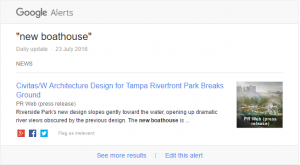by George Freitag, Op-Ed Contributor, November 10, 2016
As online shopping becomes more and more popular, the “local pack” in Google’s search results is quickly becoming the most important way for businesses to convert online customers into offline customers. As most businesses know, a key component to appearing in these local packs is optimizing your Google My Business Listing. But many underestimate the role that offsite signals — or information elsewhere on the Web about a particular business — play in optimizing a Google My Business listings. Marketers that understand these connections are better able to unlock new opportunities to reach more customers.
Accurate offsite signals (or information about your business’ name, address, phone number, etc.) is one of the best ways to reinforce and optimize your presence online. However, bad offsite signals earn a negative reaction from Google, which factors accuracy. In fact, Google can prevent businesses from being displayed in search results over such common infractions as duplicate listings on third-party sites.
Duplicate listings are instances where your business information appears more than once on directory sites like CitySearch and Superpages or even on social sites like Facebook. For example, let’s say you created a page on CitySearch that lists your information as “Paper Clip Store, 123 Fake St.” What you may not have been aware of is that another listing already exists, with slightly different details: “Paper Clip LLC, 123 Fake Street.” While this may seem like a good thing at first — since your business shows up twice in the same Web site — it actually creates distrust with the most influence source in online searches: Google, so this is a really bad idea.
The Source Of Duplicates
Duplicates often arise when business closes, moves or changes its name. For example, if a business moves into a space recently vacated by another store and you both have listings for the same address on the same directories, two conflicting listings will appear. When that Web site is next crawled by Google, it sees two businesses for the same address. How is Google supposed to know which listing to trust — and more importantly, why would Google show either business in its search results, since it has no way to tell which one is legitimate?
Consumer behavior can also be blamed for duplicate creation, often out of the control of any business. Sites like Facebook, for example, allow customers to create locations where they can “check in” and post to that activity their news feed. Customers can create locations without checking to see whether or not that location has already been created by someone else. If you already created a listing directly on Facebook or through a listing distribution solution, then a duplicate listing is created.
On top of that, business owners sometimes forget to double-check themselves and end up creating duplicate accounts on directory sites like Yelp. Business owner may search the directory site directly, but due to a slight variation of the phone number or business name, the listing doesn’t even show up in their search. In both cases, the user has now created conflicting sources for Google and as a result, lowered the trust Google is placing in this business information.
To make matters worse, duplicate listings can split the reviews and social shares of business listings, which both have a direct impact on how many people click on your business in Google. Apart from clicks, if the listing Google displays is the result of an old phone number, they can spread bad contact information to potential customers, making it impossible for them to contact you or visit your store without you ever knowing.
It’s important to note that duplicates can hide in the shadows of the Web. So unless you seek them out, you may never know they are there and wreaking havoc on your search visibility. In addition, directory sites typically don’t want to advertise that they sometimes have bad data, so they are often not helpful in surfacing this issue. As a result, closure process for many sites is confusing and time consuming since it’s not widely supported. Lastly, since the problem is so complicated, there are very few solutions that even exist online to help you address this problem.
Despite all of this, it’s something that is worth doing. Identifying and removing duplicate listings in Google and other sources can be one of the most effective ways to increase Google’s trust in your business. The more consistent and reliable your information is on third-party sites, the more likely Google is to show it in their own search results. And as a result, the more likely you are to get that foot traffic from customers searching your service online.
MediaPost.com: Search Marketing Daily
(30)
Report Post



